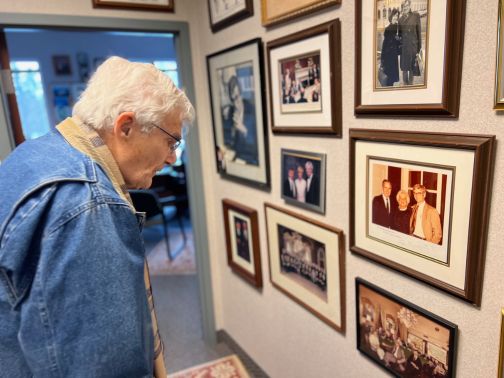REHOVOT, Israel – On a small stage in the cozy back garden of Gojo, an Ethiopian restaurant in the city 30 minutes south of Tel Aviv, former Sen. Rudy Boschwitz had a story to tell – one that played a key role in the restaurant’s existence.
Boschwitz, who lives in the western suburbs of Minneapolis, had been tasked by President George H.W. Bush in 1991 to lead the American delegation to negotiate the release of Ethiopian Jews to allow their migration to Israel – in what became known as Operation Solomon.
“He called me and he said, I should go to Ethiopia, lead a negotiating group, and see if we could set the Jews free.” Boschwitz said. Of course before he could say yes, he had to talk to his wife of 67 years, Ellen. “There was a civil war going on in Ethiopia. And I had never been in the midst of a civil war.”

Former Sen. Rudy Boschwitz holds a photo of Ethiopian Jews on a C-130 cargo plane being airlifted to Israel during Operation Solomon in 1991 (Photo by Lonny Goldsmith/TC Jewfolk).
The 92-year-old Boschwitz told the story of his role in this history as part of the Minneapolis Jewish Federation’s Experience Israel 2023 mega mission, where he and his wife were the honorary co-chairs. The importance of the restaurant and the location in Rehovot is that the city is Minneapolis’ Partnership2Gether partner city, and Gojo was opened because of support from the Jewish Agency Loan Fund, which helped owner Bosena Beyene launch the business she now managers with her son, Eli.
“In the beginning, my mother would cook for different events as a caterer,” Eli said through a translator. “She had a dream of opening a restaurant so they had to start looking for a place and they found this. The Jewish Agency has different educational opportunities for new immigrants, she took one of those courses and she studied management.”
She went from working in a textile factory for 25 years to opening the restaurant in 2015.
“Our family stood behind her and pushed her to go after her dream,” Eli said.
But before the dream of Gojo became a reality, Beyene had to get to Israel. She was one of the Ethiopian Jews who were airlifted to Israel in 1991. Operation Solomon brought more than 14,000 Ethiopian Jews to Israel in 36 hours, using 35 commercial and military planes, and featured a record 1,088 passengers on an El Al 747.
“For me, it started with [Temple Israel] Rabbi [Max] Shapiro,” said Boschwitz, who represented Minnesota in the U.S. Senate from 1978-91. Boschwitz said that Bill Halpern, a Minnesotan and a Ph.D. student who was writing a thesis on Black Jews in Ethiopia in 1973, had gone to Shapiro to help raise money to help the community there. Shapiro told Halpern “The only person I know who will raise money for any Jewish cause, and believed you with these pictures, is Rudy Boschwitz.”
Boschwitz was a businessman at that time who started the Plywood Minnesota lumber store chain, which later was named Home Valu Interiors and closed in 2010.
“Business was very good,” he said. “I had a fundraiser for him and got some of the regulars here in town, to listen to Bill, and we raised money and back he went.”
Boschwitz said Bill Halpern died in Kenya in the late 1970s in a car accident. But his connection to the issue of Ethiopian Jews continued to be strong.
After defeating Democratic Sen. Wendell Anderson in 1978, Boschwitz created in an Ethiopian Jewish Caucus, that had “30-to-40” senators, he said. It was these connections to the plight of Ethiopian Jewry that led Bush to appoint Boschwitz as the lead negotiator.
It was a role he said he was able to take on after losing his 1990 re-election bid to Democratic candidate Paul Wellstone; Wellstone won the rematch in 1996, and died in a plane crash during his 2002 bid for a third term.

Former Sen. Rudy Boschwitz gives a tour of his Wayzata office (Photo by Lonny Goldsmith/TC Jewfolk).
In his Wayzata office, Boschwitz’s walls are covered with photos of a history of life in business and politics. Photos with Republican presidents he served under – and those he may try to help elect – line the reception area, along with Senate committees he served on. He can still name most of those in the photo and frustrated that he couldn’t recall all of them.
But despite nearly 60 years in politics – including fundraising for GOP candidates now – politics wasn’t an aspiration of his.
“I came to Minnesota in 1963 and started one store, and by 1978, we had 72 of them in eight states,” he said. “Business was very nice. I had a wonderful time. I became very full of myself. I was very self-assured in my business…I’m a salesman.”
That logic served Boschwitz well as a campaigner. He won his first two elections by 17 and 18 points, respectively, before his upset loss to Wellstone. But he started in politics first as a GOP donor, and then became President Richard Nixon’s Minnesota chairman in 1968 and a “national committeeman” after that.
“That’s when I began seriously thinking about running,” he said. “My father, he wouldn’t listen to that.”
Boschwitz was born in 1930 in Berlin. He and his family left in 1933 when Adolf Hitler became chancellor.
“That day, my father came home and said to my mom, we’re going to leave Germany forever,” Boschwitz said. “He remembered Germany, and it was not healthy to be a Jewish politician. And he would, whenever I started talking about politics, he’d say ‘stick to business.’ He may have been right.”





















Great article!!